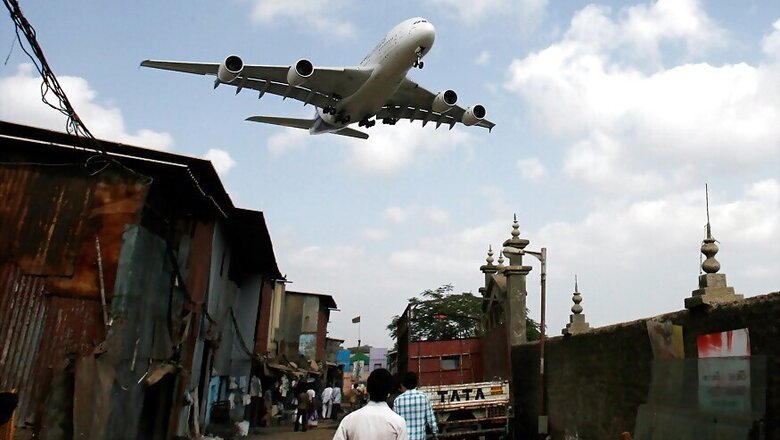
views
New Delhi: The civil aviation policy will be a turning point for the sector in attracting more players and will help take flying to the masses, stakeholders and experts on Wednesday said as they welcomed scrapping of the 5/20 international flying norms for local airlines.
"Though a 0/0 or 0/10 would have been more than welcome, the amendments that have been made to the policy are encouraging," AirAsia India CEO Amar Abrol said referring to the scrapping of 5/20 rule which also benefits the carrier. The policy gives the airline a clear direction to ramp up our operations in India and grow our business in the domestic segment before we scale our operations to fly international," he said.
He also said the airline would focus aggressively in India and expand the fleet size.
Another startup carrier Vistara also said it would have preferred a complete abolition of the 5/20 norm to ensure that Indian aviation achieves its full potential.
"It is very encouraging to see that the government has established a policy which promotes the overall growth of the industry. We would have preferred, of course, that the 5/20 rule be completely abolished to ensure that Indian aviation achieves its full potential," Vistara Chief Executive Officer Phee Teik Yeoh said.
He also said that as a domestic carrier Vistara was committed to its expansion plans in the country and now looking forward to providing connectivity to travellers to/from India.
Industry body Assocham said the policy is a turning point for the country's aviation sector as it frees the operators from the shackles of 5/20 rule for flying overseas.
Under this norm, only those domestic carriers having at least five years of operational experience and a minimum fleet of 20 planes were allowed to fly overseas.
Assocham also said that capping of airfare would propel the regional connectivity but it should be ensured the operators are not made to suffer losses on short haul routes.
The national civil aviation policy would help take flying to the masses through a slew of policy initiatives and fiscal and monetary support, Amber Dubey, Partner and Head, Aerospace and Defence, KPMG in India said.
"The highly illogical and anti-competition 5/20 rule has been replaced with 0/20, which effectively translates to 3/20 as it will take at least 3-4 years to have a 20 aircraft fleet," he noted.
Dubey, however, said the policy is unfortunately silent on issues like formation of an independent Civil Aviation Authority (CAA), privatisation of Air India and listing of AAI.
Officials of International Air Transport Association (IATA), which had expressed reservation on some provisions of the draft policy including the 5/20 rule, said they would come out with a detailed response soon. However, they pointed out that the levy for the regional connectivity fund has been limited to domestic air travel and not on international flights.
IATA's CEO and Director General Tony Tyler has expressed apprehension that "this levy is going to increase the cost of air travel. It will dampen demand. It is against ICAO principles."
AirAsia Berhad chief Tony Fernandes said it was almost an end to vested interests, referring to the government doing away with the 5/20 norm.
"Almost an end to vested interests. Power to the people. Well done @narendramodi . You kept your word," Fernandes, who has been vocal against the 5/20 rule, tweeted.
His airline is a key stakeholder in no-frills carrier AirAsia India.
Former civil aviation minister Praful Patel said the policy is a welcome step. "5/20 replaced by 0/20 is continuity with change as the sector has grown exponentially," he tweeted.
"How will air and land and regulatory infrastructure handle the phenomenal growth in future not properly addressed," Patel said, adding that the opening of the sector in 2004 has led to the phenomenal growth being witnessed today.
The Rs 2,500 cap on fares for one hour flights is also conceptually welcome, he said.
There are, however, going be lot of challenges in execution and implementation but certainly a beginning has been made, Patel said.
AirAsia India's former CEO Mittu Chadliya said the policy is a step in the right direction.
Bradra International India Pvt Ltd's Director Hiyav Bajaj said that illegal non-entitled entities would not be allowed to operate, since the policy bars contract employees from carrying out ground handling on behalf of the airlines.
"With the announcement of the National Civil Aviation Policy, the Ministry has now consolidated its policies and intended actions on various sub-sectors providing directional guidance to the industry. The Ministry has sought to provide a fillip to the sector through putting in place a mechanism for providing transparent viability gap funding for regional connectivity, as well as proposing measures for a segment like MRO," Peeyush Naidu Partner at Deloitte India said.
Commenting on the policy, industry body FICCI said that it will pave way for a balanced growth in the aviation sector.
"It (policy) is a progressive policy-framework towards ensuring a safe and sustainable development of the aviation sector in India. The comprehensive, well thought out policy will pave the way for a balanced aviation growth in the country," FICCI civil aviation committee co-chairman Palash Roy Chowdhury said.
According to PwC India's Partner for aerospace and defence, Dhiraj Mathur, amending the 5/20 rule and measures for improving the regional connectivity are the two key takeaways of the new civil aviation policy.
"There are two clear key takeaways from the new policy. The first is a focus on increasing competition in the market by amending the 5/20 rule. The second is on improving regional connectivity through a slew of measures that include the Regional Connectivity Scheme (RCS), improving infrastructure and building low cost airports, involving state governments through commitments on providing free services and low taxes to these low cost airports and lower level of taxation on MRO," he said.
As far as amendment to 5/20 rule is concerned, it should attract new entrants, he said adding the requirement of 20 aircraft is reasonable.
"As far as capping of domestic fares to Rs 2500 per hour on only the RCS routes is concerned, this is a welcome decision. To increase penetration of aviation in India, cost competitiveness is important," he added.
The long-awaited new civil aviation policy has some path breaking changes that should unlock regional connectivity as well as open up opportunities for carriers entering the Indian market, Sharat Dhall, President, Yatra.com, said.
"By subsidizing the shorter domestic routes for the airlines, the government has given a strong push to regional connectivity by capping fares and thereby expanding the market," he said.
According to global strategy consulting firm Roland Berger India, the policy is a significant step forward in ensuring the interests of all stakeholders.
"The policy will go towards making India an aviation friendly regime and help in broad-basing the coverage and network," Rahul Gangal, Partner (Aerospace and Defence) at Roland Berger India said.




















Comments
0 comment